Blog
March 25th, 2011
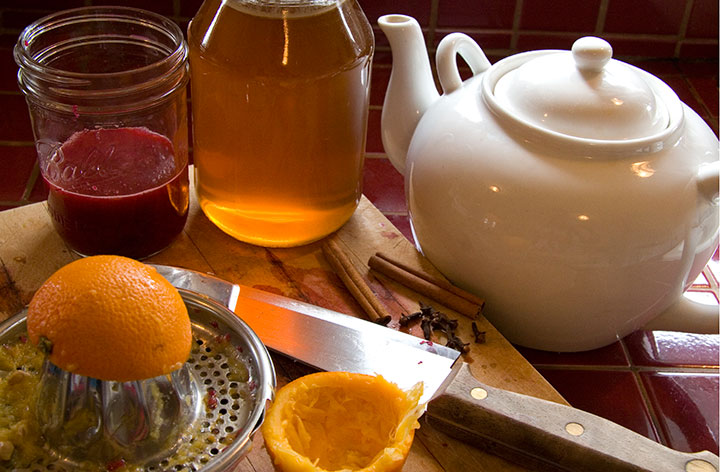
It might officially be spring out there, but around the house, winter still has us in its grip. Both the Tailor and I have been battling a particularly nasty, über virus for weeks now, so no matter how promising the weather reports might be, my brain is just screaming at me to stay home. I’m finally on the upswing, it seems, but just to give the ol’ system an extra boost, I’m chugging citrus like there’s no tomorrow.
My favorite thing is to squeeze a big splash of lemon and orange juice into piping hot Earl Grey—this time I juiced a couple of last October’s ruby-red pomegranates (yep, they’ll keep that long!) as well, since I haven’t had a chance to pick up any of the blood oranges that are just coming into season now. I toss in a few cloves and cinnamon sticks, stir it with a goodly dollop of honey, and sip away. And suddenly I feel far less poorly … at least until my mug is empty again. Which reminds me—I think I hear the kettle whistling.
July 5th, 2010

This is Carol, a fiery Sicilian kindred spirit and one of my favorite-est people on the planet. She and her fabulous husband, Jeff, hosted a Fourth of July shindig in their garden today, threats of rain and cold, dreary weather be darned.

There was a little music,

a healthy dose of croquet,

(with the added hazard of the course bordering a rhododendron thicket and a 30-foot drop to the street below)

a whole lot of laughter,
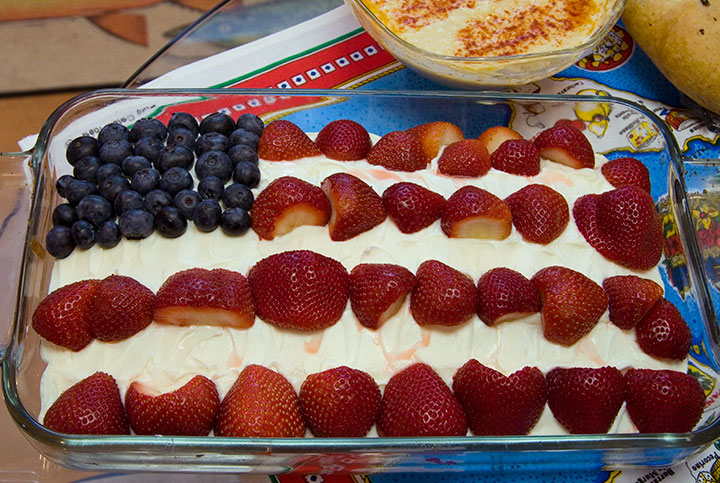
and a walloping smörgåsbord that included plenty beyond your typical Fourth o’ July fare. Hey, hummus goes great with stars-and-stripes cake!

We contributed our ice cream crank, plenty of mashed strawberries, and our upper body strength.
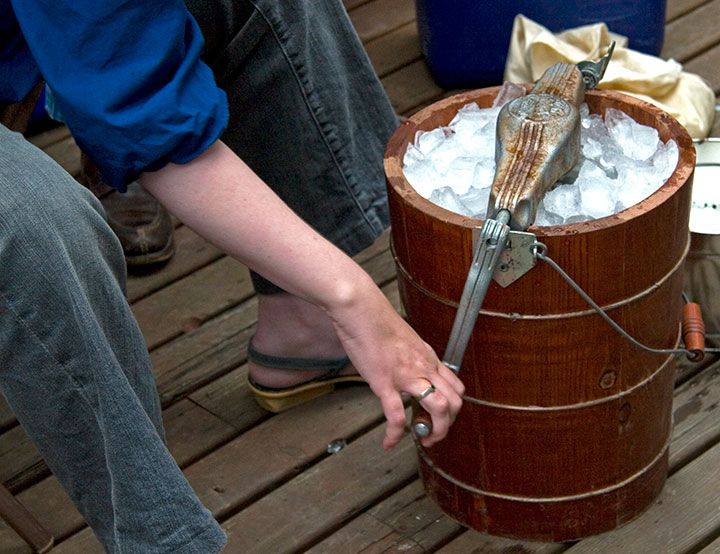
I’m glad there were plenty of people to share the job of cranking, because I like to cut to the chase.
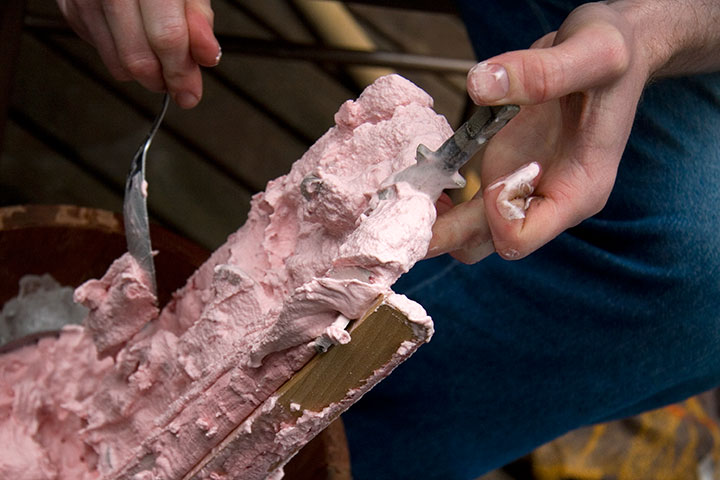
Namely, this. My favorite part is when everybody grabs a spoon and helps clean off the dash,

though I’m sure the novelty alone was the highlight for some. Sure, it was a little cold for ice cream (we’re not exactly known for hot summers here), but everyone just threw on another clothing layer before digging in.

After we had all eaten ourselves silly, everyone gathered on Carol and Jeff’s porch, which faces the Sound—

—and provides a front-row seat for the main event.

Happy Independence Day!
June 5th, 2010
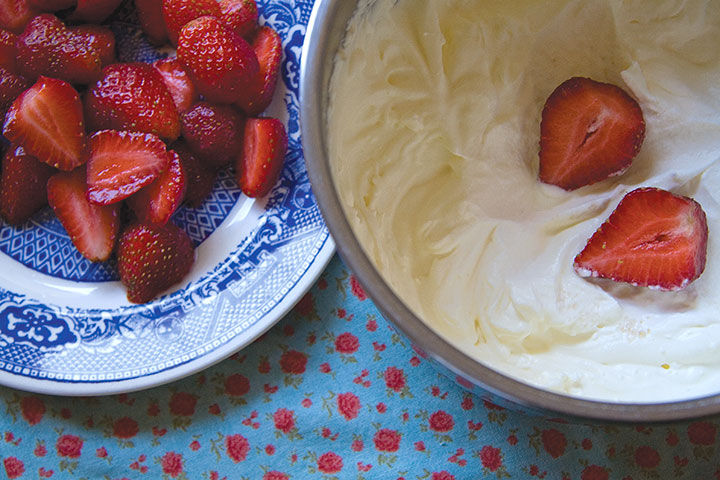
If I ran the world, there would be a national holiday to celebrate the first strawberries and cream of the season. This is worth the closing of stores, school cancellations, paid vacation time. I would send greeting cards for this. Happy Berry Day!
May 2nd, 2010
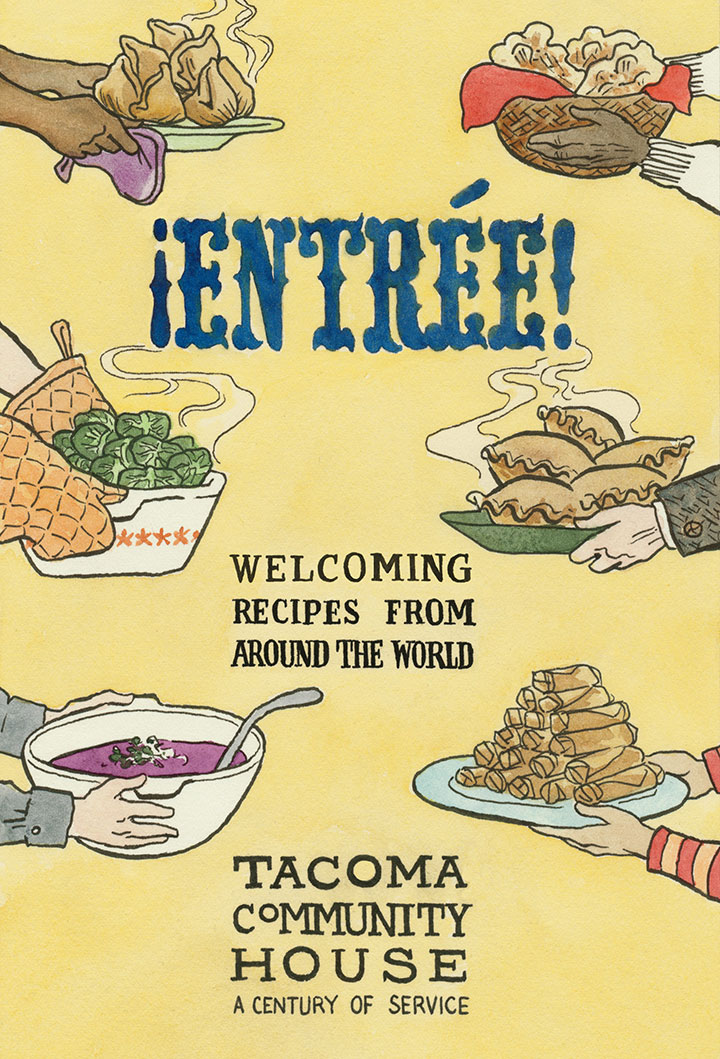
I think it’s time to get that new wok I’ve been meaning to buy, because I have a feeling it’s going to get a lot of use. The cookbook I illustrated is now available, and I can’t wait to give it a whirl.
Tacoma Community House has been serving Tacoma’s immigrant community for decades, offering an enormous range of educational and social services to its clients—including language translation and interpretation, job training, citizenship assistance, and employment programs. The diversity of clients is astounding—in the last year alone, TCH served clients from fifty-four countries. To bring their clients together and welcome them to the community, TCH has a tradition of holding potluck dinners. As a result, they’ve compiled an impressive collection of international recipes over the years. In honor of their 100th anniversary this year (can you believe that?), TCH has compiled a collection of their favorites into a cookbook: ¡Entrée!

I have a feeling they had quite a job of editing; ¡Entrée! contains over 140 recipes from five world regions. Even the name is a play on this diversity, combining the inverted exclamation point from Spanish with a French term.


Dishes represented here include empanadas, tabouli, spring rolls, moussaka, samosas, gazpacho, cottage pie, a wide range of curries, and even American Indian fry bread.
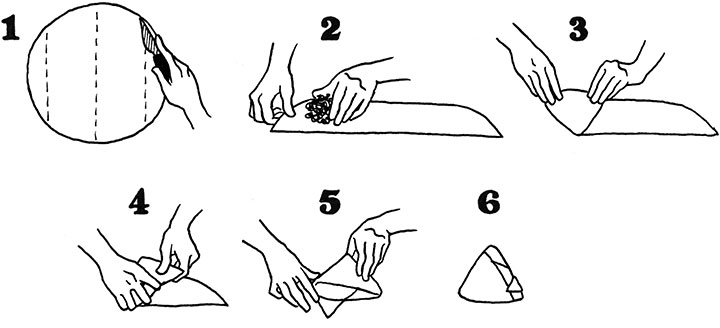

To bring all these recipes together into a cohesive theme, all the illustrations focused on hands—which came in handy for the step-by-step instructions.
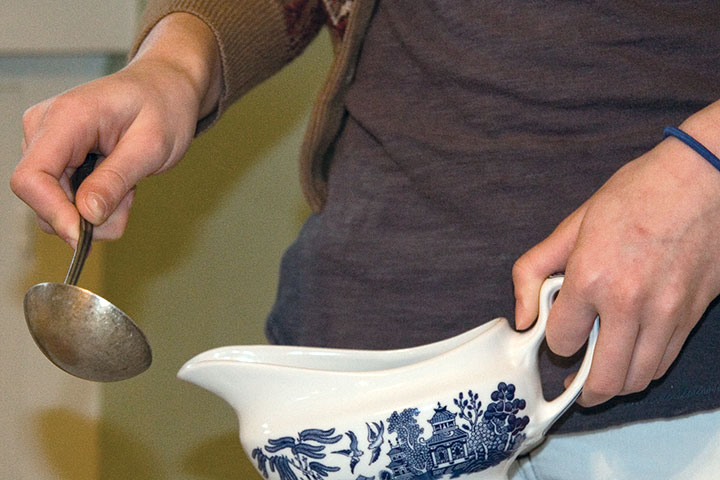

(Hence all the hand-modeling by Zooey.)


Each recipe is as authentic as it gets—instead of being filtered through some chef or ethnic restaurant, these dishes come directly from the family traditions of TCH’s clients. They even passed the Tailor test (and he has high standards!)—no processed ingredients, no store-bought shortcuts, no mention of canned cream-of-mushroom soup. He even gave the English plum pudding recipe (which is one of his specialties) his stamp of approval.
I think I’ll be trying this one first:
Arroz Mexicano (Mexican Rice)
1/2 cup tomato sauce
1/2 cup water
2 green onions, chopped
2 cloves garlic, chopped
1/4 tsp salt
2 Tbsp lard or cooking oil
1 cup long grain rice
Tip: It’s important in Mexican rice to fry the rice before you add the liquids. It will make a difference in the texure and taste.
1. Mix tomato sauce and water together; add green onions, garlic and salt to the tomato sauce.
2. Heat lard or oil in a sauce pan on medium-high heat; add the rice and cook till slightly brown.
3. Add tomato sauce mixture and lower the heat; add more water of the mixture does not cover the rice. Cover and let simmer for about 20 minutes or until liquid is gone from the pan.
4. Lard is used by many Mexican families for cooking instead of cooking oils.
Oh, and about the lard: heck, yes. If you’ve ever tried refried beans at an authentic Mexican restaurant, the lard is what makes it taste so good. Don’t be afraid—a little lard won’t kill you. Go ahead and try it! Learn it, love it, lard it.
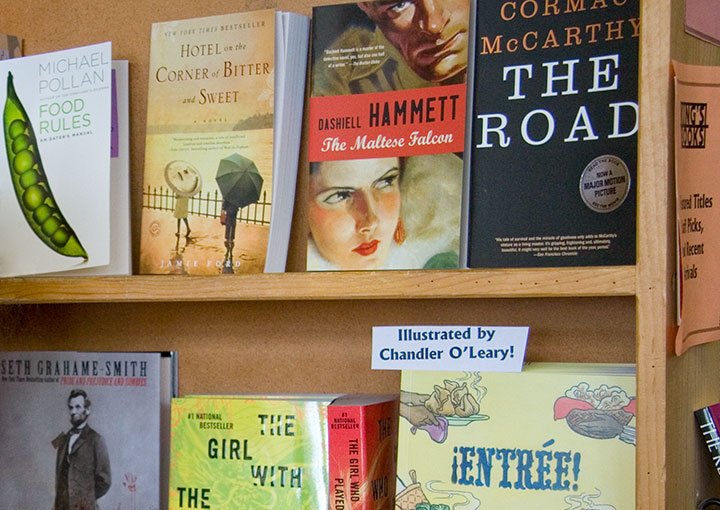
I loved working with TCH (and with Hana K., their talented designer, who treated my illustrations with such care), but even better was seeing ¡Entrée! on a bookstore shelf. You can find a copy in town at King’s Books, or you can try more sample recipes and order online here.
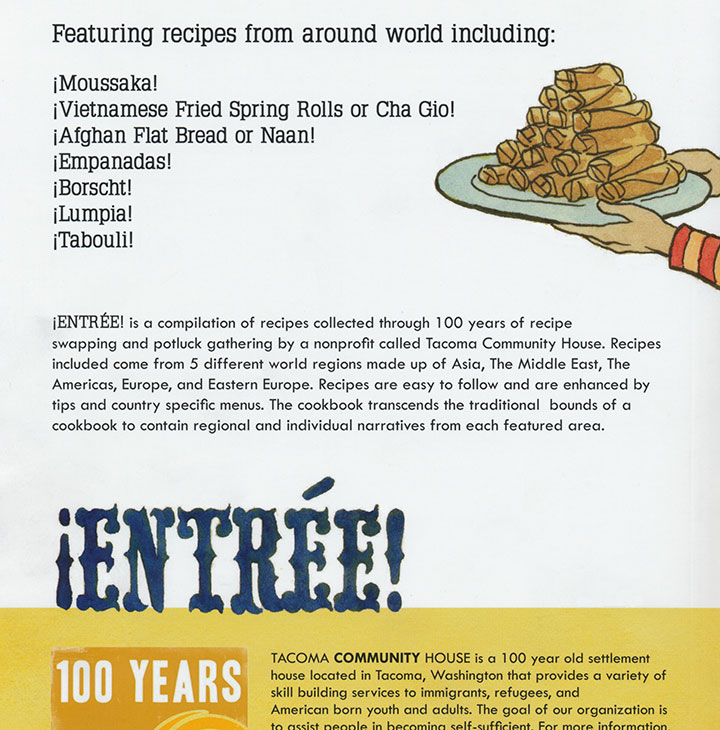
January 26th, 2010

I’m currently working on the illustrations for a cookbook being published this year, so I’m drawing a whole lot of hands lately. Hands carrying dishes, maneuvering chopsticks, folding samosas, kneading dough, etc.
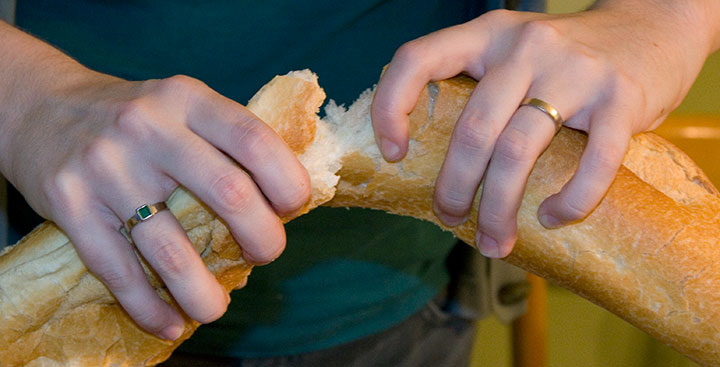
Since I usually work by myself, I often have to be my own model. For the most part, this works out fine, but hands are a tricky business—especially when you need to draw both hands at once, and you need one to operate a pencil.
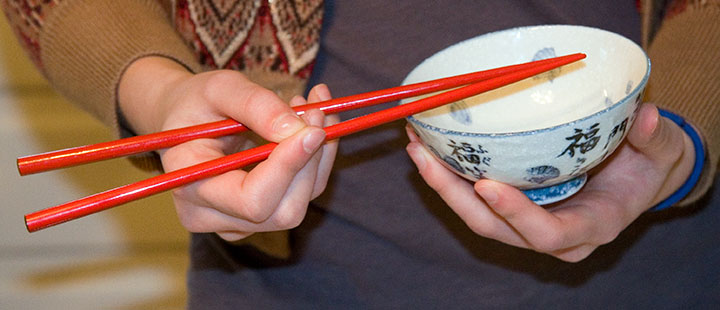
Enter the lovely Zooey—who could both photograph my hands for me and be hand model herself. We took turns ripping a baguette to shreds for the camera (to mix up the hand anatomy), and mimed with nearly every dish in the house, just in case.
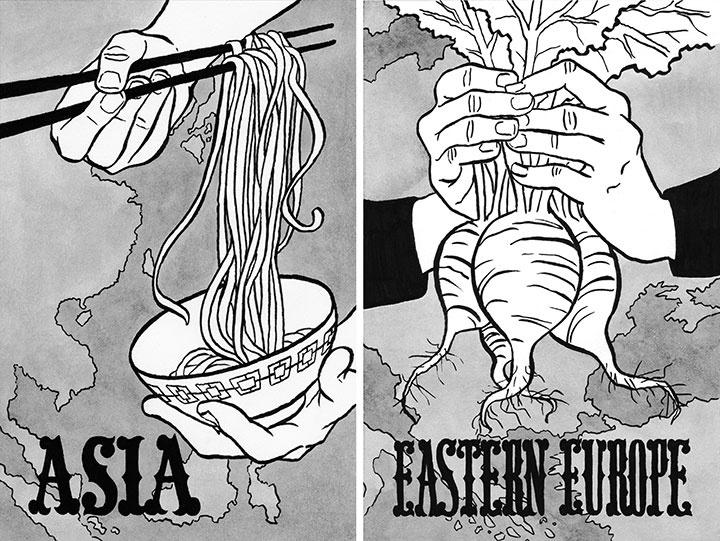
I can’t tell you how helpful it’s been to have her here while I’ve been doing these illustrations. Whenever something wasn’t quite right, I could say, “Hey, Zooey, can you pick up those chopsticks again? I need to sketch a different angle.” And Bob’s your uncle, I’d get what I needed.
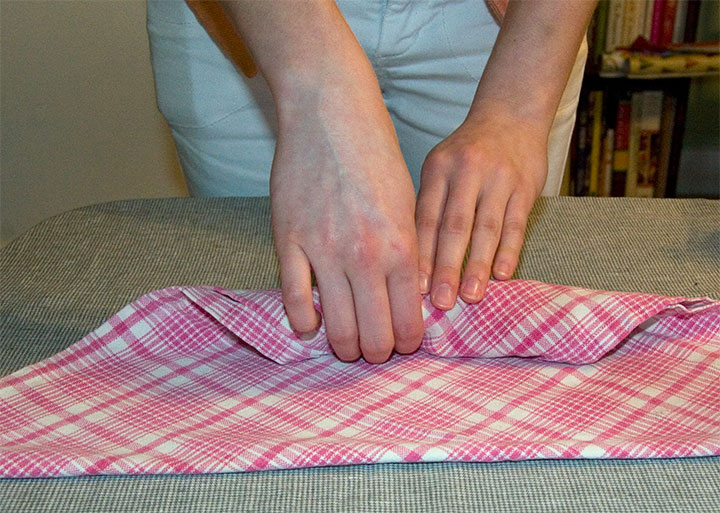
This week we spent a couple of afternoons shooting reference photos. Zooey rolled and unrolled pretend spring rolls made of fabric and made “samosas” with a scrap of denim.
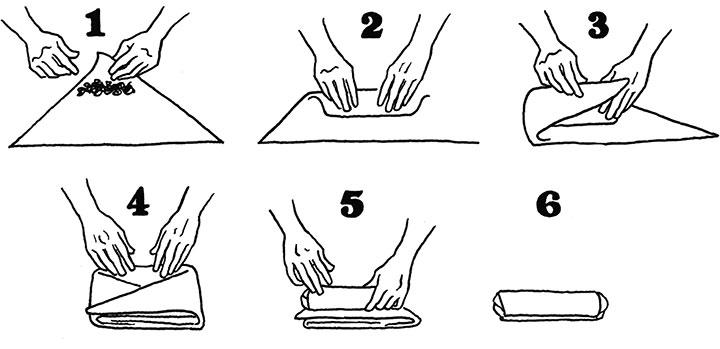
It was probably tedious for her, but the end result was a bunch of instructional illustrations that actually made sense!
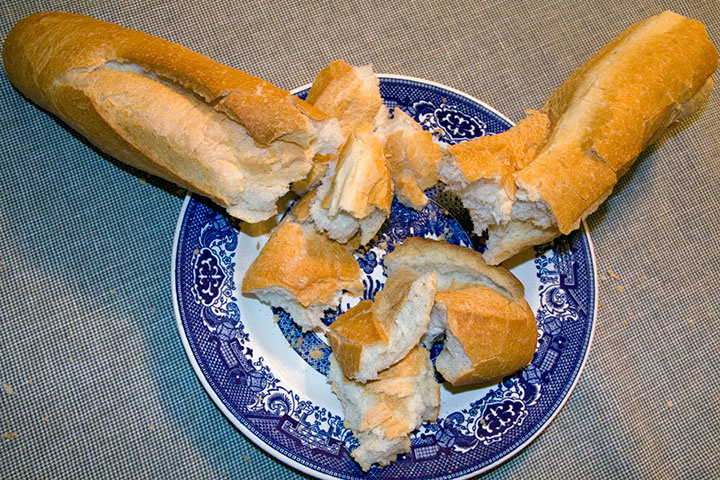
And we made a mess of the bread (doesn’t make it taste any less good!), but Zooey can say she has some pretty, uh, unique on-the-job training under her belt.
• • • • • • • • • • • • • • • • • • • • • • • • • • • • • • • • • • • • • • • • • • • • • • • • • • • • • • • • • • • •
In other news, I did a little website tweaking over the weekend, and added an F.A.Q. (it makes me giggle to pronounce it “Fack.”) If you ever wondered what I mean about half the things I say around here (and judging by the volume of questions I get on a nearly daily basis, you might), go and check it out here—it’s a whopper.
It ended up being a lot of fun to write, because I got to play the part of the snarky interrogator (not that I get many of those, but it’s fun to write like one). I did practice some restraint, however; I was tempted to include a question I get more often than I’d like to admit: “Wait, aren’t you a guy?” True story. Sigh.
Also in the running was “Will you print 1000 coffee mugs with ‘World’s Number One Dad’ for me?” Because I really did get that email once, along with quite a few others mistaking my business for something entirely different. Maybe this will clear things up just a bit…
December 6th, 2009
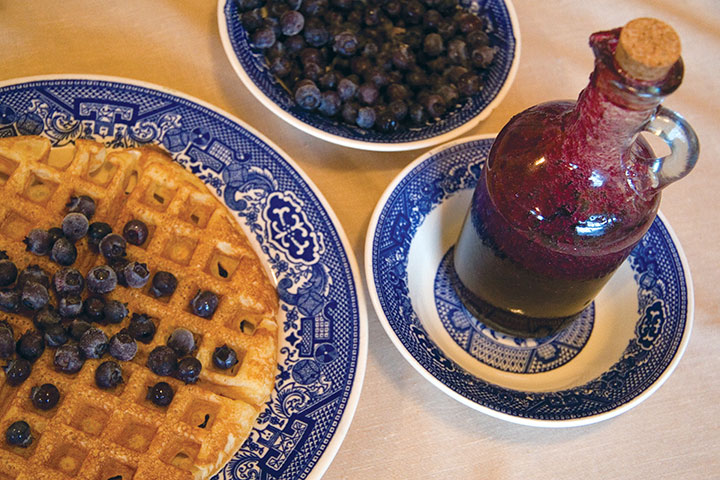
For months now we’ve been finding new ways to use our stores of dried, home-canned and preserved blueberries. But we almost forgot about the containers of fresh berries we threw in the freezer—and on this unseasonably cold* morning, whipping up a little reminder of summer seemed like a good idea.
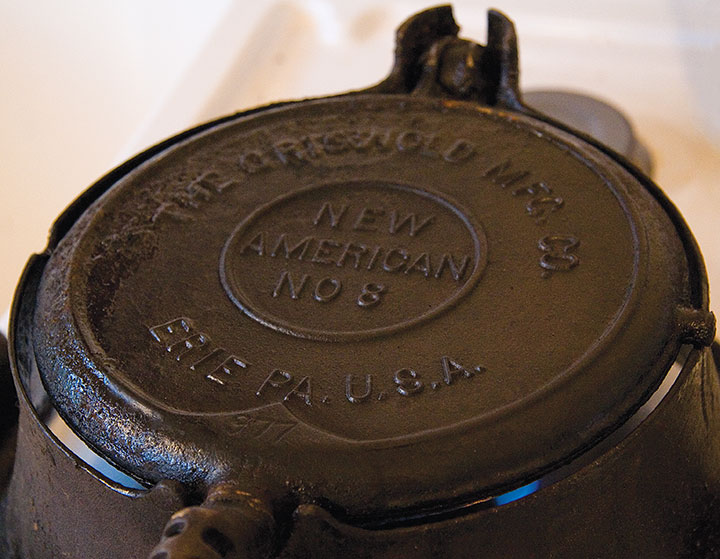
So the Tailor fired up the Cast-Iron Stovetop High-Collared No. 8 Griswold Waffle Iron™ (say that five times fast!), and we had ourselves a good old-fashioned hot breakfast—which, incidentally, goes great with the homemade blueberry syrup above, but the Tailor won’t share that recipe, I’m afraid.
No-Kiddin’ Waffles
2 ¼ cup flour
4 tsp. baking powder
¾ tsp. salt
1 ½ Tbsp. sugar
2 eggs, beaten
2 ¼ cup whole milk
½ cup oil (we use Canola)
Sift the flour, baking powder and salt three times, then add the sugar. In a separate bowl, mix the beaten eggs, milk and oil. Add this to the dry ingredients and mix thoroughly. While some people like to make their batter ahead of time, we’re firm believers in using fresh-fresh-fresh batter. So for best results, make your waffles right then and there.
Oil your cast-iron waffle iron well before starting. Heat both sides of the iron thoroughly (the advantage of a high-collared iron like this is even heating and plenty of room to flip waffles), and remember to apply oil after every third or fourth waffle—a bristle brush is handy for this.

Use a 1/2 cup measure to dip batter—one dip per waffle—and pour the batter into the center of the iron. When you close the lid, the batter will wick evenly into all the nooks and crannies.

Cook the waffle for 3-4 minutes (peek occasionally to make sure your iron isn’t too hot!), flipping frequently—every thirty seconds or so. The best part (other than the flipping, that is)? Waffles are kind of like pizza—you can jazz them up however you like with your favorite breakfast condiments. But eat ’em fast—a jazzed-up waffle will get cold and soggy** before too long.
That’s never a worry around here, though—these babies get gobbled up long before the next waffle is ready!
• •••••••• ••••••••• ••••••••• ••••••••• ••••••••• ••••••••• •••••••••
* I know all you Minnesotans are rolling your eyes at this declaration, but a nighttime temperature of 17°F is enough to force us to rescue our squash colony from the attic, which isn’t insulated for “real” winter. So until the attic temperature stays above freezing, our pumpkins and butternuts are living in the spare bedroom like edible houseguests—definitely one of the less glamorous aspects of living seasonally.
** I’m really into the specific heat of foods. Mashed potatoes? High specific heat. Fresh waffles? Sadly low.
October 27th, 2009

Now that we live in a vacation destination, we tend to get a lot of out-of-town visitors. We have a list of favorite places to take first-timers, so we can often be found at places like the Pike Place Market, Point Defiance, and Mt. Rainier with house guests in tow. When a pair of French foodies arrive on your doorstep, however, it’s a whole ‘nother ballgame. Our friends Gilles and Jean-Philippe had just one major request for their visit last weekend: mushroom hunting. Since it’s chanterelle season and the weather was good, Saturday seemed like a good day to lace up our hiking boots and grab our pocket knives.
Disclaimer! The Tailor and I are not experienced mushroom gatherers, so we’d never try this on our own—incorrectly identifying edible fungi is not a mistake one wants to make. Even the most detailed books can’t replace the presence of a skilled guide, so if you don’t have your own French mycophile on hand to take you hunting, skip the risk and buy a bag of chanterelles at the farmers market!
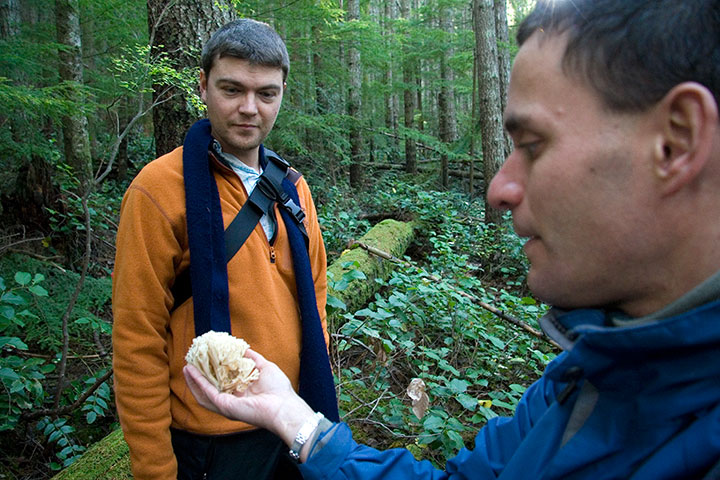
As far as dinner ingredients go, we came away empty-handed—the conditions just weren’t right. But as a crash course in the sheer diversity of local fungi, it was a spectacular day; we found several dozen different varieties ranging from beautiful to bizarre; delicate to disgusting.
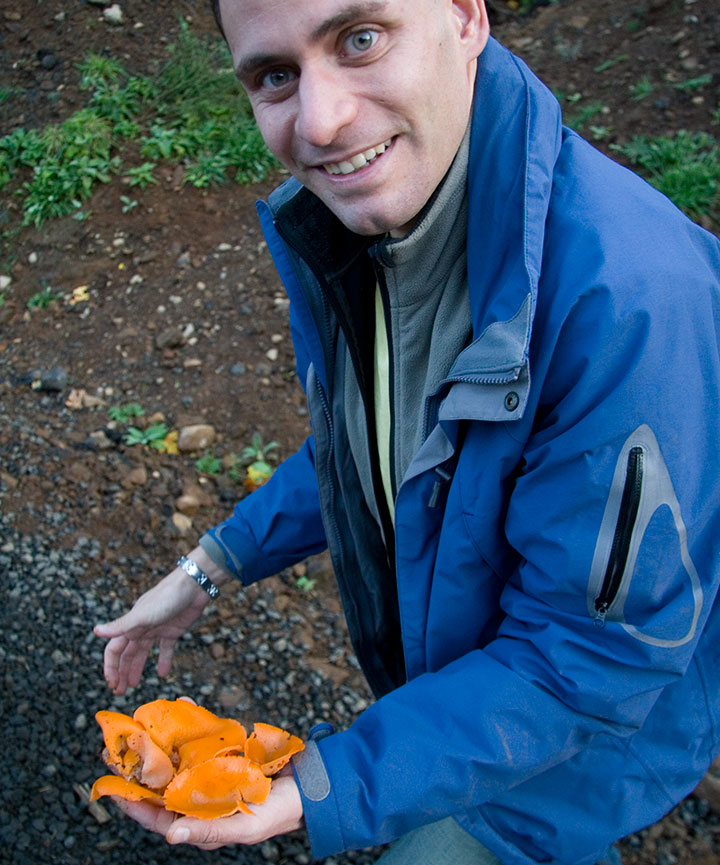
We did find a few edible species (these orange peel cups were a beautiful and exciting highlight), but nothing worth turning into a meal. So the day turned out to be more of a scientific field trip—certainly a worthwhile adventure in its own right.
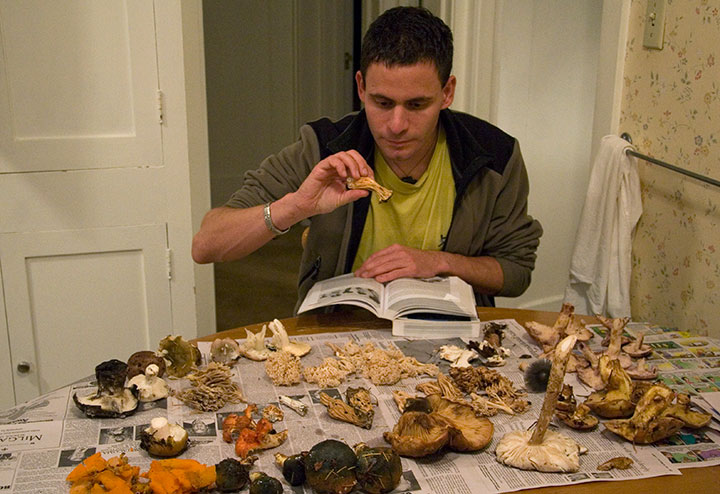
When we got home, Gilles spread out our haul and set to work identifying, making us laugh whenever he called out something strange (stinkhorn, elfin saddle, hedgehog—called sheep’s foot or pied-de-mouton in France).

As for me, all this mushroom-naming reminded me of the newest addition to my reference library: the stunning Pictorial Webster’s, by book artist John Carrera (for a mind-blowing art experience, check out the video on the process behind the book here). So I took a page out of his book (sorry, I couldn’t resist), and did a little visual taxonomy of my own.
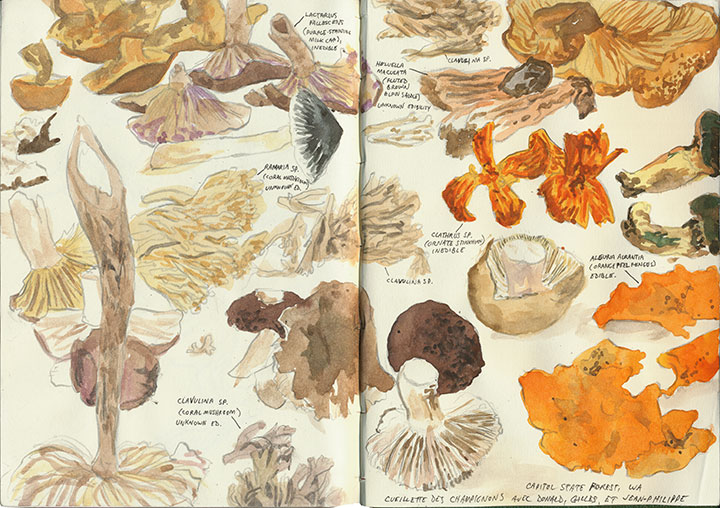
Jean-Philippe, meanwhile, had the best idea yet: purchasing a pound or two of fresh chanterelles, and putting his mad French cooking skills to work. The sumptuous champignons dish he whipped up disappeared into our mouths long before I thought to grab the camera, but I did remember to ask for the recipe:
Chanterelles à l’improvisation
– 1 1/2 pounds fresh chanterelle mushrooms, halved
– 1/2 cup bacon (3 slices or so)
– 1 medium yellow onion, chopped
– 4 to 5 Tbsp olive oil
– 1/4 cup dry white wine (the Muscadet we had on hand was great)
– dry parsley to taste (fresh is better, but we didn’t have any)
– salt and pepper to taste
Brown the bacon until crisp, then break into small pieces. In a separate, large pan (so as not to overpower the mushrooms with the flavor of bacon fat), sautée the onions in olive oil over medium-low heat until lightly browned. Add the chanterelles, bacon, salt, pepper, and white wine, and sautée until the mushrooms are slightly limp and drained of most of their water content (oh, say 5 or 6 minutes). Season with parsley at the very end, then serve either alone or over brown rice. Watch the dinner conversation devolve into a series of satisfied grunts.
October 22nd, 2009
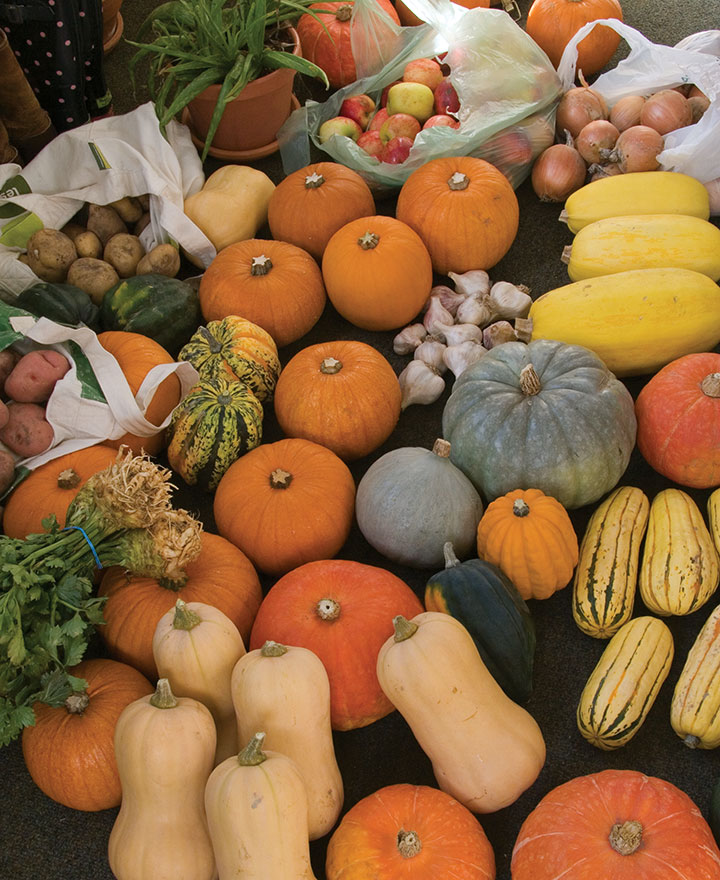
If you had seen our back porch last weekend, you’d probably think we were starting our own farmers market. But this is a typical sight for many seasonal foodies like us; when you swear off strawberries in January, you need enough fresh autumn fruits and veggies to last you until the end of April (notwithstanding my usual February freak-out where I cave in to a craving or two for salad).
We still have quite a ways to go yet, but we’re working hard to fill our root cellar, attic, freezer and pantry shelves with a wide variety of staples and goodies to keep our winter diet interesting. Here’s what we’ve got so far:
In the root cellar:
– 20 lbs. onions
– 10 lbs. apples (still need 2 bushels)
– 10 lbs. potatoes (still need at least 80 lbs., plus a bushel of carrots and parsnips)
– 9 bottles of wine
In the freezer:
– 4 lbs. locally cured, nitrate-free bacon
– 5 whole, local “Rosie” chickens
– various cuts of local, organic meat
– various cuts of venison, provided by my father-in-law
In the refrigerator:
– 5 lbs. fresh cranberries (for canning; more to come)
– 2 or 3 red cabbages
– 6 or so honeycrisp apples (which don’t keep long but are my favorite kind)
– 1 bunch celeriac root now in my belly—yum!
– 1 lb. garlic
In the pantry:
– 25 lbs. rolled oats
– 5 lbs. steel-cut oats
– 10 lbs. coarse-ground grits (not local, obviously, but the mill is definitely a mom n’ pop operation)
– at least 6 different kinds of rice
– 30 lbs. sugar (mostly for canning)
– 3 quarts local, single-source honey
– 15 or so different varieties of loose-leaf tea
The Tailor’s 2009 home preserving yield to date:
– 5.5 quarts dried blueberries
– 6 pints blueberry syrup
– 5 pints canned whole blueberries
– 9 pints blueberry jam
– 9.5 pints blackberry jam
– 8.5 pints raspberry jam
– 6 pints strawberry jam
– 15 pints canned heirloom tomatoes
– 16 pints tomato sauce
– still to come: apple butter, apple sauce, cranberry sauce, chicken broth
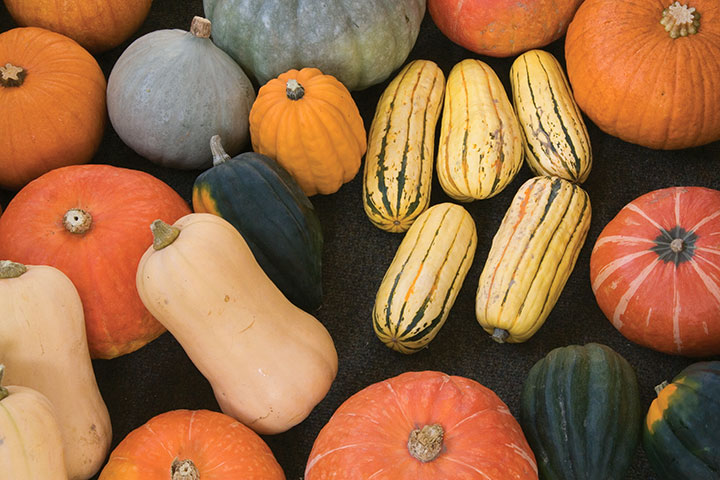
And then there’s the winter squash in the attic: one of my favorite parts of the season, and of living and eating in the Pacific Northwest.
In the attic:
– 14 sugar pie pumpkins
– 8 kabocha squash
– 7 delicata squash
– 6 carnival squash
– 7 acorn squash
– 6 butternut squash
– 3 spaghetti squash
– 1 mini hubbard squash
– 1 jarrahdale pumpkin
Okay, we might have gone a little overboard on the squash, but I never get tired of it, and it’s an important staple of a seasonal diet. We keep these babies in the attic because they last much longer there—pumpkins and squash prefer a cool, dry environment to the cool humidity of the cellar. Our squash colony is a big conversation piece, and we get a lot of questions about pumpkin storage, so I’ll share the scoop:
First, choose squash and pumpkins with intact stems—those that have had their stems snapped off won’t last long. Next, make sure your squash was harvested before the first hard freeze; post-freeze specimens rot fast. Check around the stem and on the bottom end for any mold, rot, blemishes, damage, or sogginess. Now it’s time to sock them away—an attic is best, but anywhere that’s cool, dry and dark will work fine (but never let them freeze! During a cold snap last year we had to haul them all down into the living room when the attic hit 32 degrees!). Don’t stack your squash; just like apples, a rotten squash can infect any neighbors it touches. Instead, we make little “nests” for them by crumpling up newspaper and cushioning each one individually, in a single layer. As long as they’re unblemished and in good shape, and stored carefully, many varieties will last until at least March. Spaghetti squash will often keep until April, but sadly, butternut (my absolute favorite) tends to have the shortest lifespan. So eat those first, and relish every bite.
I feel like a little pumpkin pie. How about you?
October 11th, 2009
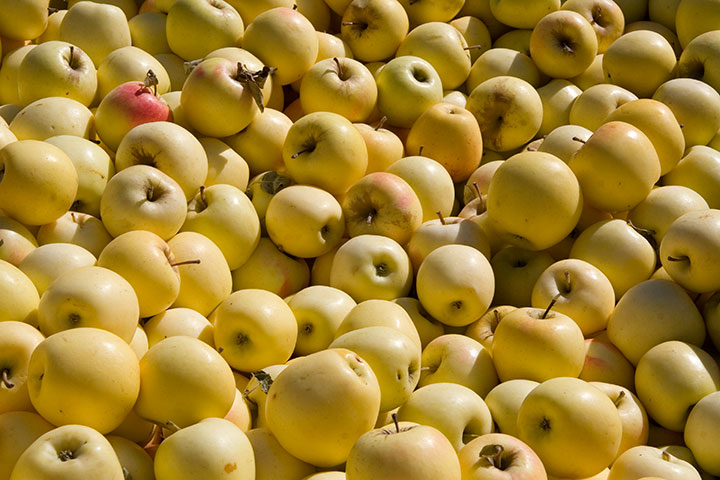
Autumn is, hands-down, my favorite time of year. So many of the things I love about fall have to do with food (mulled cider, pumpkin pie, spiced apples, butternut squash, fried green tomatoes, celeriac—the list goes on and on), and since the Tailor and I eat as seasonally and locally as we can, it’s a darn good thing we live in a state with such abundant produce at hand.
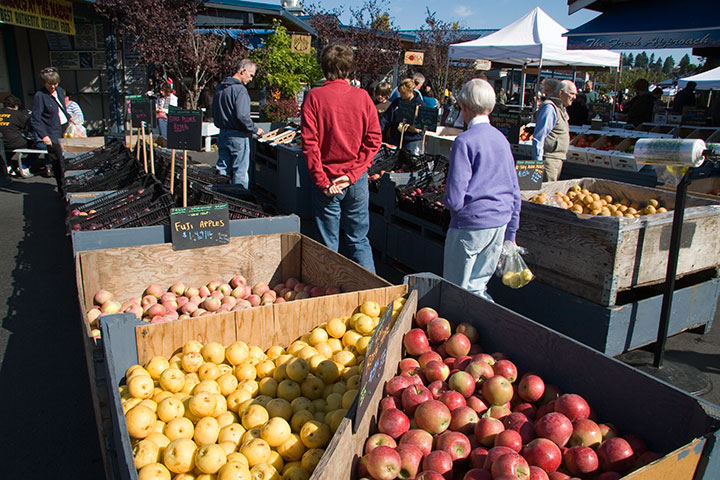
Both T-town and Seattle have incredible open-air markets (hello, Pike Place? I love you.), but my favorite of all is the quietly-unassuming Olympia Farmers Market. Our state capital might not be the hoppin’ tourist hub that downtown Seattle is, but Olympia’s gigantic, spectacular market is one of the best I’ve ever seen, anywhere.
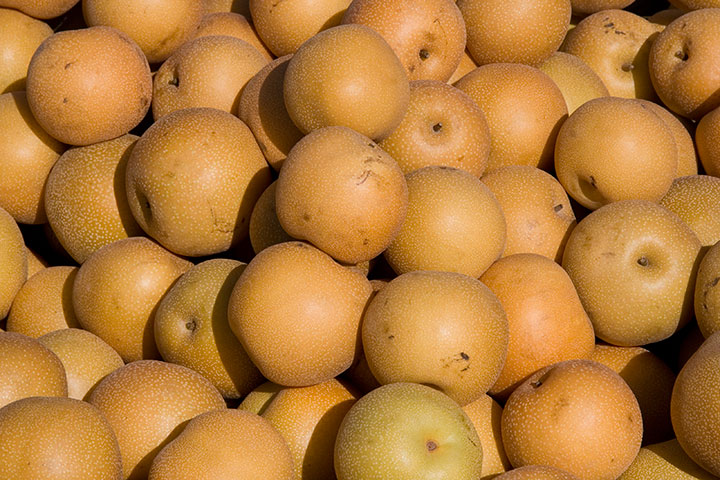
This is the place where you can find around forty different types of Washington apples, and another dozen or so kinds of pears (above are Asian pears, which count as honorary apples in my book).
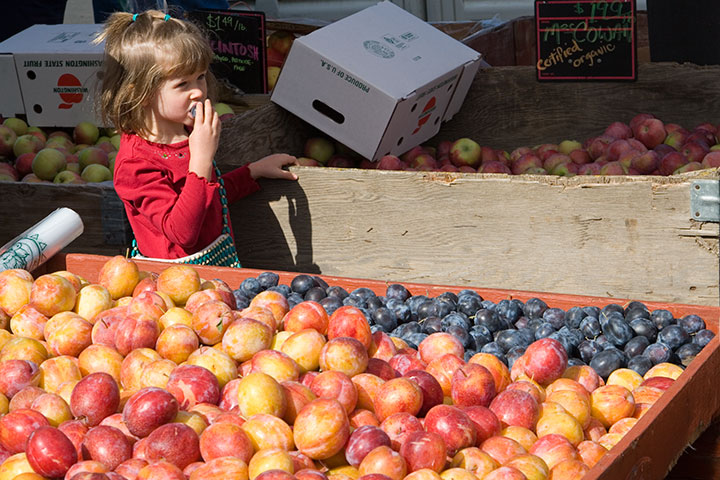
And there’s plenty of everything else, too. The sheer variety is staggering, and distracting—especially when your mission for the day is to buy just one variety of overwintering apples for your root cellar.
Though I must say, I love seeing the transformation from this:
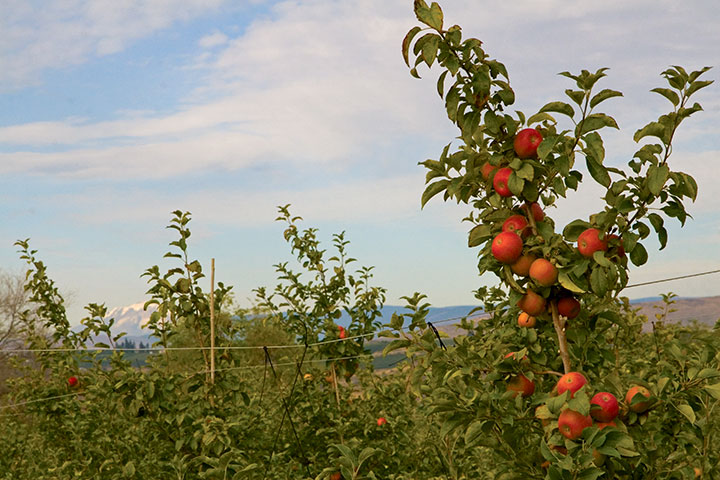
To this:
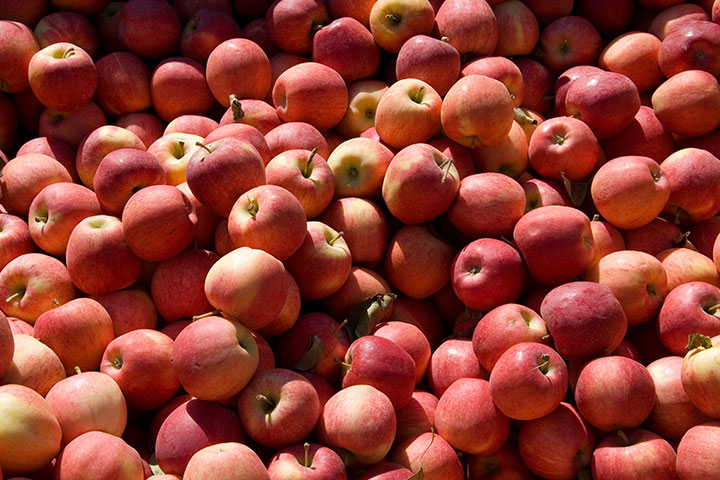
Ingredients for a perfect Sunday: crisp sunny weather, countless apple bins to dig through, a handful of friendly Olympians, and a dash of live bluegrass music for spice.
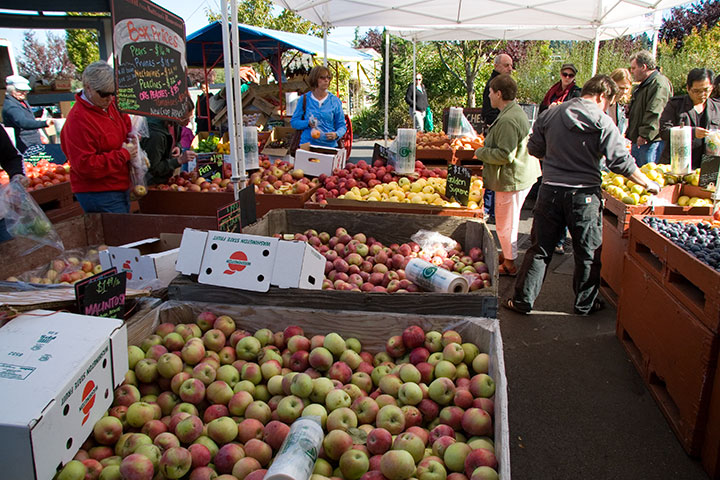
The apples are always a show-stopper, but our biggest goal for the day was something we can’t get at any of the three Tacoma farmers markets:
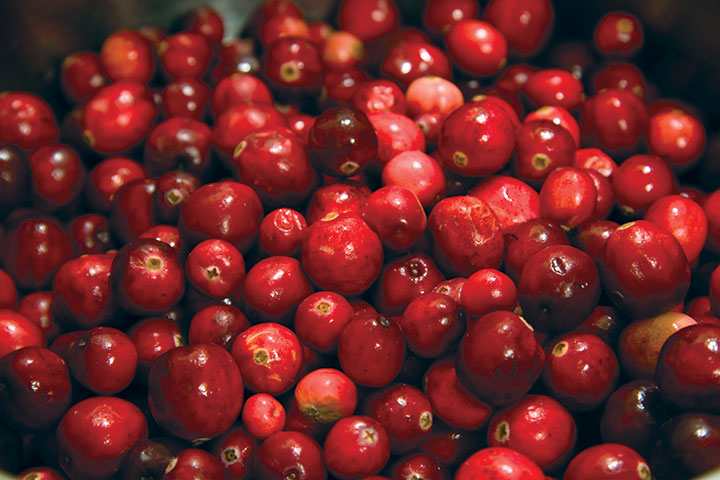
Fresh cranberries. Olympia is the first stop for cranberries coming in from the coast, and the season is now in full swing. We took home just five pounds this time, but you can bet we’ll be back for more. The Tailor and I have a deep and abiding love for cranberry sauce (it’s great on grits. Don’t look at me like that.), and we kicked off this year’s harvest by finishing off the last jar of our 2008 canning crop.
Homemade cranberry sauce is an incredibly easy thing—so much so that I really don’t understand why so many recipes call for Jello. Cranberries have so much natural pectin in them that with enough sugar they’ll jell on their own. In any event, the Tailor and I believe that cranberry sauce should be a sauce, not a can-shaped cylinder of jelly. So in honor of those little rubies from our rugged coast, here is our favorite recipe:
Cranberry sauce
– 1 lb. fresh cranberries, washed and drained
– 2 c. water
– 1 1/2 c. sugar
Combine the water and sugar and bring to a boil in a small saucepan. Boil for about two minutes on high before stirring in the cranberries. Put the lid on and listen; when the cranberries start popping like crazy and the sauce has begun to foam up, it’s done. This takes less than five minutes. Serve hot or cold (or on grits!).
Note: remember to put that lid on, or you’ll have hot, popping cranberries everywhere!
September 13th, 2009
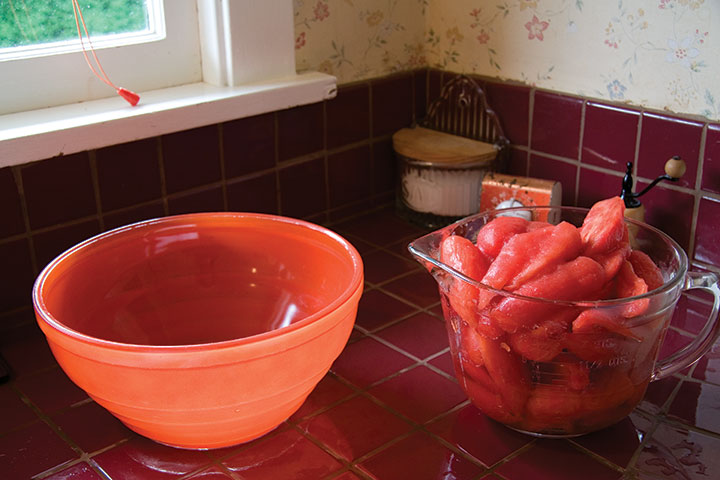
The season is turning ’round these parts—it seems the whole world is tinged with hints of red and gold. We had another warm weekend, but I’m not fooled; behind the hot sun are chill mornings and the rush of the harvest.
So it was another canning weekend for the Tailor, supplied by our latest farmer’s market haul and our final trip to the Blueberry Park for the year. We had to work hard for it yesterday, but amongst the nearly-spent, now-crimson bushes, we found just enough berries for one more batch of jam. Our total haul for the year? Over fourteen gallons of blueberries! In the spring we’ll return the favor by volunteering.
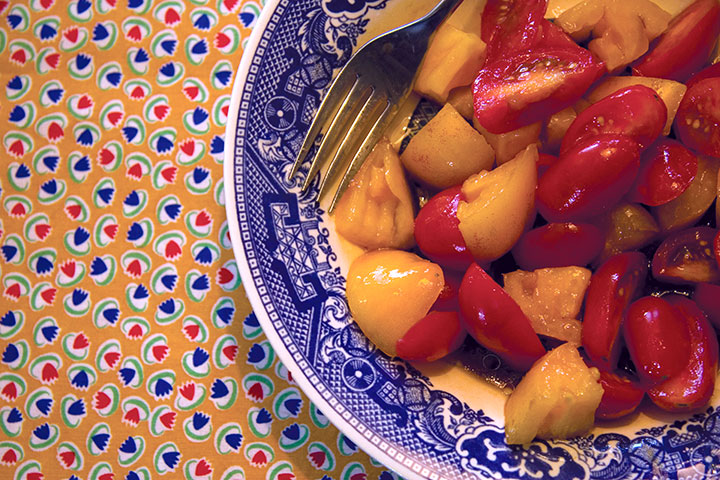
There’s no time to pine for berry season, though—now we’re up to our eyeballs in heirloom tomatoes (like these beauties from our favorite farm in the Puyallup Valley, splashed with a little oil and balsamic). And soon it’ll be time to get the root cellar and attic ready for a winter’s worth of squash, onions, potatoes, and pumpkins (more on that later). Marking transitions is my favorite part of eating seasonally, and autumn is my favorite time of year. I’ll be ready for fall’s bounty—camera in one hand, fork in the other.

![Chandler O'Leary [logo]](https://chandleroleary.com/wp-content/themes/chandleroleary/images/logo.png)






















































